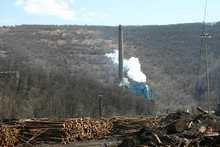A bill supported by environmental organizations that carved out an important exception for the Luke paper mill is struggling after being rejected by a House committee.
While the bill remains alive in the Senate, the prognosis for final passage is uncertain.
Should the bill fail, it returns the situation to the status quo and the Luke mill would be unaffected, officials said.
But the status quo is a bad idea, said a spokesman for a key Maryland environmental group.
 “This critical bill for Maryland consumers and the environment overwhelmingly passed the Senate with bipartisan support and came just one vote short of passage in a key House committee. Unfortunately, a handful of delegates decided to continue to send Maryland ratepayer dollars to out-of-state, polluting companies. This bill would have supported new, clean-energy jobs in Maryland,” said Tom Carlson, the Maryland campaign director for the Chesapeake Climate Action Network.
“This critical bill for Maryland consumers and the environment overwhelmingly passed the Senate with bipartisan support and came just one vote short of passage in a key House committee. Unfortunately, a handful of delegates decided to continue to send Maryland ratepayer dollars to out-of-state, polluting companies. This bill would have supported new, clean-energy jobs in Maryland,” said Tom Carlson, the Maryland campaign director for the Chesapeake Climate Action Network.
Carlson said he wasn’t sure how likely reviving the bill in the House was, but the network would continue to work with delegates.
Fighting the battle against industry lobbyists in Annapolis isn’t an easy task, Carlson said.
“The Senate version of the bill remains alive and could be acted on favorably by a ... House committee in the next week if any delegate reconsiders their position,” Carlson said.
The bill passed the Senate 33-13 on March 28, but the companion House bill was reported unfavorably by the House Economic Matters Committee by one vote on April 1.
The bill includes a list of renewable energy sources and makes the Luke paper plant eligible for renewable energy certificates.
“It’s like taking 250,000 cars off the road,” said Carlson.
The bill is also good for consumers, because it stops tax dollars from going to out-of-state companies.
In 2011, Carlson said, the certificates were worth $3.8 million, 91 percent of which ended up out of state.
The energy certificates can be traded and sold. Their value is equal to one megawatt-hour of electricity generated by a renewable energy source.
The certificates are expected to grow in value as time passes, sending more money to out of state companies, Carlson said.
It could amount to a value of $33 million heading out of state next year, Carlson said.
“The longer we wait, the worse this is. ... It’s outrageous,” Carlson said.
The initial bill would have redefined renewable energy sources to exclude “black liquor,” Carlson said.
The current bill’s certificates for the mill would expire in 2018.
The bill, though, directs the governor to find funding for the plant equivalent to what they might lose from phase-out of the certificates.
New Page Corp., based in Miamisburg, Ohio, owns the Luke mill and is a leading producer of coated paper in North America that operates 10 paper mills with 20 paper machines in the U.S. and Canada.
